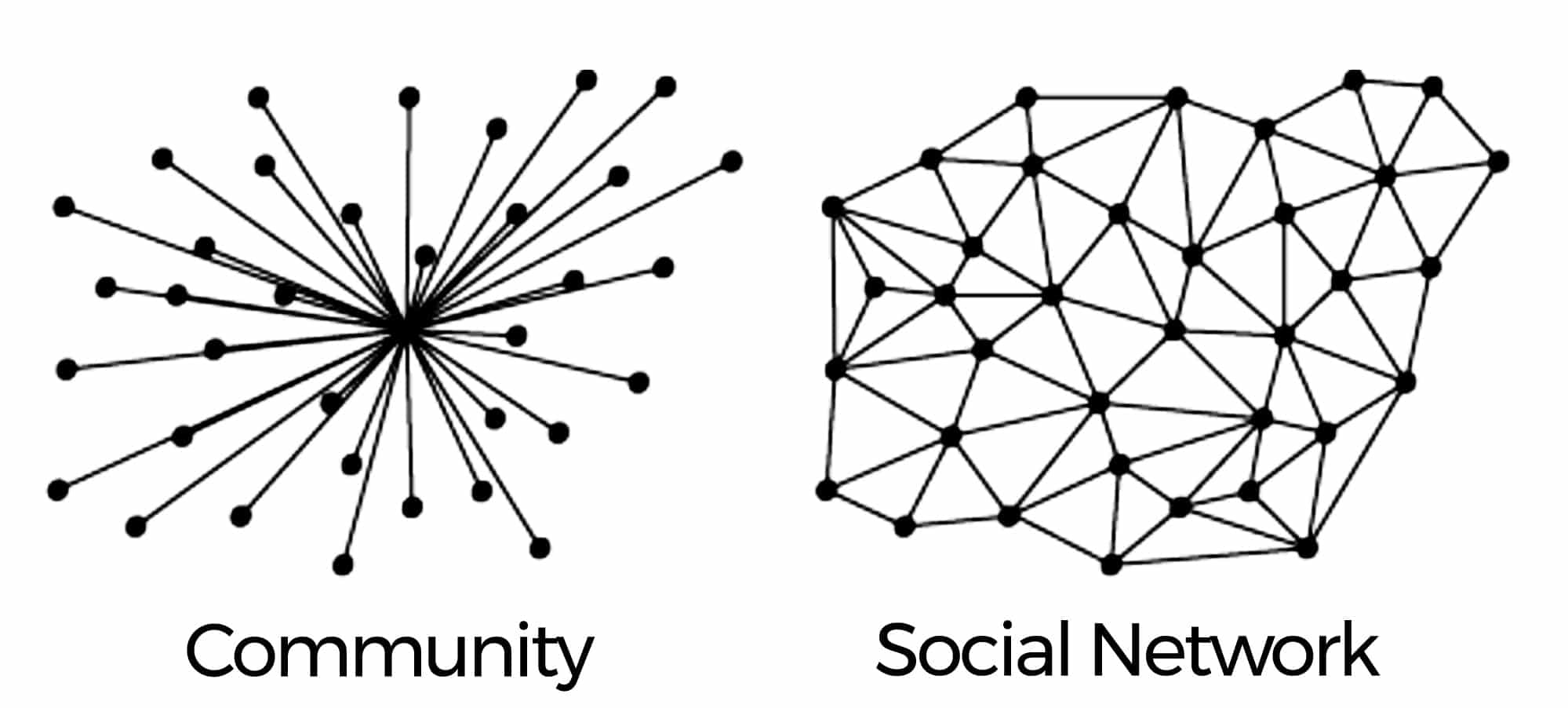Filter by Category
Filter by Category
Contents
I am about to try and persuade you of the benefits of building engaged communities on your owned media channels.
There are three key points I want to make. First, social media is not owned media. Second, owned media is not social. And third, neither social media or owned media are fit to host communities. That’s why I firmly believe there’s room for a new category: Community Media.
Let me kick this off by saying I’m biased. Very biased. For me, it’s personal. I am the founder of Disciple, a company whose mission is to empower people to build communities. This was borne out of my own frustrations when trying to build a community around the record label I was part of. I was faced with an unwelcome compromise: either I had to make do with static, unloved websites and mailing lists – or – surrender my content to social media to connect with their audiences.
It was a trade-off between community and control that I didn’t want to make. And I believe that many others feel the same. So I am hardly a neutral when I say I believe the emerging technology category in which my company sits – Community Media – is going to become very important in the coming months and years.
Some of these companies allow you to build an own branded community on their centralised platform (Amino) and others allow you to build your own niche community (such as ourselves and Mighty Networks).
#1. Social Media is not owned media
People in marketing talk of three types of media channel; paid, owned, and earned. But where does social media sit? When social media started out, it was a relatively cost-effective way to reach and engage an audience in your own space.
Lots has changed over the last decade. Facebook is now the category king of mass social networks: the owner of Facebook, WhatsApp & Instagram and the world’s largest social media holding company.
As Mark Bonchek wrote in the Harvard Business review in 2015: “It’s true that you own your social media accounts and profiles. That’s like having your name on the mailbox. But as your landlord, these companies can enter your apartment at will, renovate the building whenever they like — and keep the profits resulting from improvements you make to the property.
“There are many advantages to leasing a property. But don’t confuse the rights of a renter with the freedom of an owner. Third-party social media platforms are a combination of paid and earned, not owned.”
So at best, social is rented media, except that we, as tenants, don’t have any rights.
Until recently, that’s been fine. After all, if it’s a ‘free service’ you kind of expect some shabby treatment to go with the territory. And the consensus view has been: why go through all the hassle of building and retaining a community on your owned media channels when the entire world is pinned to Facebook like mesmerised goldfish 28 hours a day, 367 days a year?
The analogy I often heard from community managers was: ‘If you want to catch fish, go to where the fish are’ and there’s 1.4 billion of them on Facebook every day. But the price of bait is increasing and if you try to fish without it you won’t catch much. I’m not going to deny social media is an extraordinary way to reach your customers/ audience but today it is very much a paid channel, not an owned one.
A recent study by AdEspresso puts the average cost of getting someone to click on a piece of content at about $1.10. And for those who choose not to pay, the industry benchmarks for ‘organic reach’ hovers at around 1-2%.
That’s right. About 98% of the people who have ‘liked’ you in the past will not even have an opportunity to see your posts (let alone click on them) unless you’re paying. And actual, meaningful engagement is just a fraction of that figure.
Worse, all this happens in your audience’s news feed, not on your page. And context is important because you’re competing for attention amongst the daily projectiles of fake news, celeb facelifts, top-10 reasons to visit Turkmenistan and god knows what else Facebook’s addictive algorithm thinks you’re most likely to click on.
Facebook is a vastly superior advertising platform because it’s made addiction its killer app and has absolutely no higher purpose other than to keep us clicking and scrolling. It is the greatest machine ever created for addicting a human to a screen and surveilling their thoughts, emotions, hates and fears to serve the right ad at the right time.
I’m not going to deny social media is an extraordinary way to reach your customers but today it is very much a paid channel, not an owned one.
#2. Owned media is great in principle, but the technology is very 2005
Visually, it’s great. WIX, Squarespace and others will help you build a website that looks like something straight out of a glossy Conde Nast magazine for as little as £10 pounds a month.
They’re also not bad at getting people to buy stuff from them (provided you’ve paid Google and Facebook enough money to get them there in the first place) but these websites still amount to little more than digital billboards that will only generate fleeting glimpses, a decent-enough experience to warrant a return visit, but not real engagement or dwell-time.
The majority of forum chats that simply migrated to social media and owned media failed to evolve – calcifying in a kind of pre-web 2.0 stasis. Websites became more and more static and unloved, native apps became gimmicks and were then pretty much given up with.
The only owned media channel that has held on in there as a way to engage your core community is the good old email list. Email still average 25-30% open rates according to Mailchimp and 2-3% click-through rates.
Compared to the 1-3% even seeing your post on Facebook and a click rate of about 0.02% this is pretty good. But email is now taking a thrashing in the post-GDPR world.
As I write this, GDPR has just come into effect. And already, reports are flooding in that it’s been armageddon for many companies’ email subscribers. It’s now being referred to as the ‘mass unsubscribe’ because so many lists were cobbled together over time with a pretty liberal sense of what ‘consent’ meant.
Plus, people are sick of being bombarded with spam and emails of little value landing in their inbox.
And, like forums, email is also an ageing technology. Nothing about it has really changed. Yes, we now get glossy emails with embedded content and real-time surveys, but it’s still just a broadcast medium. It’s a great tool for telling people who are interested, your latest news but not much else.
#3. Neither social or owned media is fit for communities
In February 2017 Mark Zuckerberg framed Facebook’s mission as building a ‘global community’, but this is a contradiction in terms. Social networks rely on scale. If you look at your own connections on social media you’ll see a potted history of your previous interactions. The only common thread is you.
Communities are, by nature, local or built around single points of interest.
A community is a place where unconnected people congregate, bound by a single shared interest – whether that’s a brand, opinion, institution, place, the underground music scene, the list goes on.
It’s the single shared interest that provides the common thread and the basis of interconnection, not the other way around.

The above illustration shows the fundamentally different structure of a network versus a community. In the community, all eyes are focused on the host or centre. They are undistracted, committed and valuable.
Mark Zuckerberg clearly recognises the value that real communities could bring to his platform, in the way that YouTube has brilliantly captured the enormous value that video creators have brought to its platform.
This is why Facebook is trying to reposition itself as a community platform. Right now it’s little more than a marketing word – and people can see right through it.
Facebook has hinted that an ad-free, paid-for version may be in development and the company has defied its critics in the past. Maybe it will come up with a new product to serve communities – but I’d argue it’s become too wedded to being a mass paid media platform to pivot.
But for now, social networks and community platforms are totally different beasts and we should stop treating social networks as a substitute for a real community.
Which brings me back to where I started. I founded Disciple back in 2015 with a fairly simple idea: to create the tools to allow musicians to connect directly with their fans via native apps.
Music artists had been disintermediated from their audiences by platforms such as Facebook and YouTube, Spotify and Apple Music. And an opportunity existed to build direct connections through native apps. Apps that would allow artists to publish music, videos, images and livestreams. Apps that gave fans a space to connect with each other. Apps that gave artists the choice of how she, he or they wanted to monetise this audience of super-fans.
It soon became evident that musicians weren’t the only group of people who could benefit from our product and we started getting a lot of interest from YouTubers, lifestyle coaches, fitness trainers and celebrity chefs.
In fact, Disciple’s vision appeals to any modern-day community leader who has carved out a niche and a following around their own brand or institution and is tired of big social platforms taking the lion’s share of the value they create.
Schools, charities, businesses, brands, politicians, celebs – Community Platforms now make it possible to build your own community around a single point of interest, on your terms for minimal cost.
If you want your community to grow and build value for you, you need to own it and control it. Use social media to raise awareness of your community in order to meet your marketing needs by all means. But you don’t have to host it there.
The rise of Community Platforms such as Disciple Media, Mighty Networks and others means you no longer have to make the tradeoff between social media’s technology and owned media’s control. It most certainly is time to own it again.
Seb Abecasis in
2 August, 2021
7 min read
Share:

See how Disciple can fit your business needs
Learn about the many benefits
of a Disciple community
Learn about the many benefits of a Disciple community
Related Articles
5 min read
Community building: The next chapter for Disciple.
Disciple was founded on the idea that bands and artists should have a direct relationship with their most …
3 min read
Disciple launches communities for top talents
Disciple Media, the mobile technology company, today announces the release of its new digital community platform with the …
2 min read






